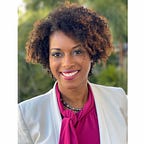Where Can I Be Black in a White America?
I remember vividly the night Barack Obama got elected. I remember watching him walking to the podium with his family beside him, how glorious they looked, how full my heart was, how I was so happy to be alive to see that moment in history. I met up with my family from across the country for his inauguration on January 20 in DC, made even more special because that day was also my mom’s birthday. I remember feeling like a page had turned in America’s history, and we’d never be the same.
I had no idea the change would be so fatal. I can clearly contrast that with the night Donald Trump was elected. I called my mom that election night as well, but this time in tears, truly shocked to my core that someone so openly hateful and disparaging towards non-white people and women could receive tens of millions of votes from my “fellow” Americans. Since that night, a reality has been unleashed across this country that I still can’t stomach and from which I wish I could run.
As a Black person in America, one must regularly interact with those of different backgrounds. Usually, I relish in those opportunities. I love experiencing diverse cultures and experiences, and I have sought that out from my youth. However, the day after Trump was elected, I couldn’t help but look at the white people around me and wonder if they were part of those who secretly supported him during the primaries. As time has gone on, his boldness has emboldened those who agree with him, and now the climate in America has me downright afraid for my life.
As a Black professional, I’m already frequently misunderstood, mischaracterized and viewed as an outsider. As a Black person, I’m viewed as a danger and a threat when I walk down the street, when I’m behind the wheel of an unmoving vehicle, when I’m shopping at the corner store, when I’m joking around with friends, when I’m protecting my children in my car, when I’m sleeping in my bed. It has been shown in multiple instances that if you are white, the police are able to disarm you, deescalate you, arrest you after you’ve killed people, let you punch them and steal their car, let you walk the streets armed and let you kill Black people without the same consequences as if you were Black.
While I’m walking around fearful, the Republican National Convention is spotlighting a baffling (and false) counter-narrative: those who believe that Black lives matter are violent and destructive; a couple in Missouri was right to draw their weapons on protestors and lie about what led up to their threatening Black demonstrators; a lie that those who want healthcare in America are Socialist; a series of speakers who say something is going to be taken from them if there is equality in America; a clear bias towards white people being able to bear arms — and shoot people — but Black people cannot exercise their rights of free speech, to protest, or to bear arms. And there are people who agree with those perspectives, but I can’t tell if they’re sitting next to me.
I have said it before — my experiences with injustice have me looking for danger where there ought be safety. Microaggressions are shortening my lifespan, and the lifespans of my fellow Black people. I don’t know who to trust. I don’t know where safety is. I don’t know where to go or what to do.
We need safe places to simply be. I long for the day my hope can be rekindled. Today is simply not that day.
